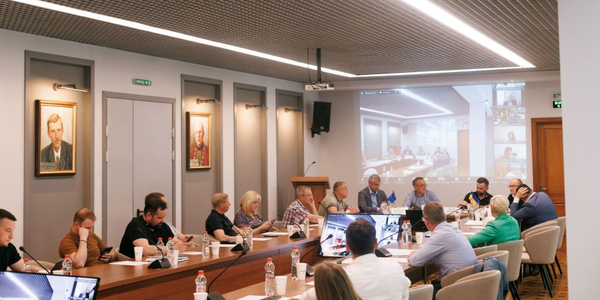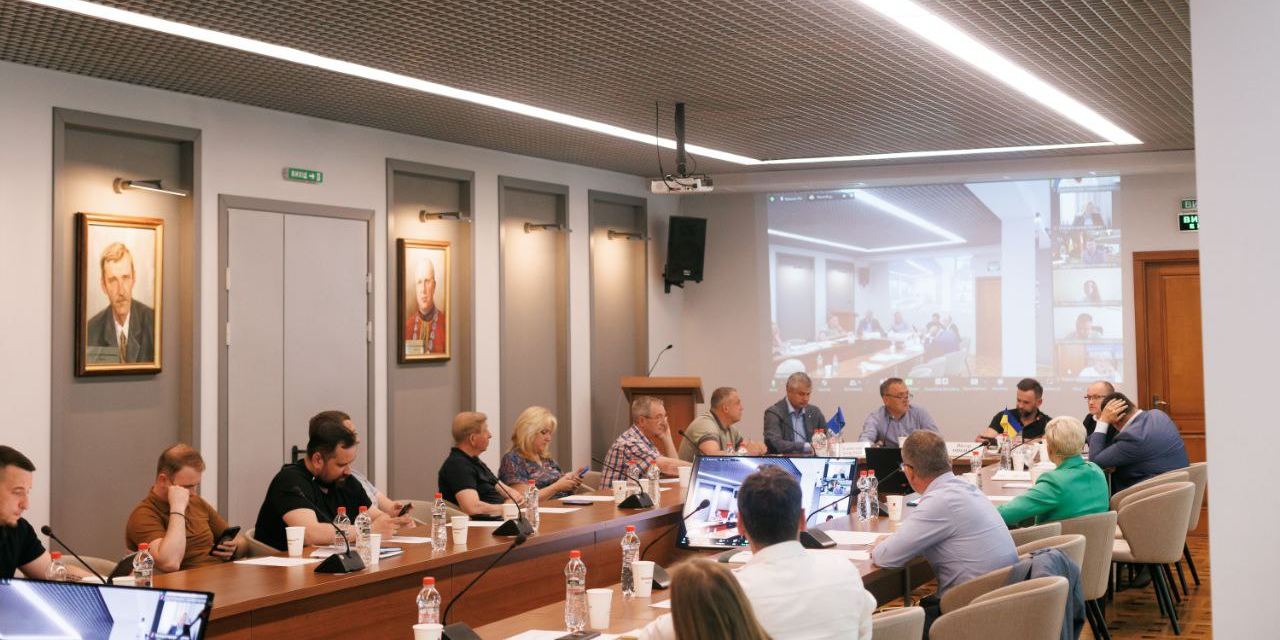What should be the format of participation of local self-government in cross-border cooperation? Summary of Congressional hearings
On June 15, the Congressional hearings were held on the development of cross-border cooperation, legislative regulation of the participation of local self-government in cross-border cooperation.
The discussion was organised by the Office of the Congress of Local and Regional Authorities under the President of Ukraine in cooperation with the Zakarpattia Regional Military Administration and DIYSNO NGO.
“Today we have heard representatives of the regions and experts who have experience in implementing cross-border cooperation projects. Their proposals should be taken into account in the new draft law, which is currently being developed by a group of MPs. It is important that we heard from all representatives of regional administrations about their desire to help municipalities in the establishment of international partnerships and the implementation of cross-border cooperation projects and programmes, about their willingness to coordinate and support rather than control. This is the shift in the paradigm of state administrations that we sought at the very beginning of the decentralisation reform,” said Viacheslav Nehoda, Head of the Office of the Congress of Local and Regional Authorities under the President of Ukraine.
Viktor Mykyta, Chairman of the Chamber of Regions of the Congress, Chairman of the Zakarpattia Regional Military Administration, stated the following:
“Since the beginning of the war, the municipalities have been forced to build their cross-border activities at their own discretion. It’s time for some clarity. Fortunately, the Parliament established the Subcommittee on Cooperation of Municipalities and Regions partly for this purpose. Our task is to organise the work of municipalities, districts and regions in order to establish mutual relations and receive assistance from the countries that support us. Obviously, this cooperation increased several times during the war, but there is no clear register or procedures, so it is difficult for the state to protect municipalities from unwanted decisions, to help establish partnerships. Hopefully, the draft law presented today will solve most of the existing issues in this area.”

Volodymyr Chubirko, Chairman of the Zakarpattia Regional Council, made the following statement:
“Since the outset of the war, we have been working in close cooperation with the Regional Administration. Cooperation like that should be in all regions, because if we cannot come to an understanding internally, international partners will definitely be unable to understand us. By establishing cross-border cooperation, we are showing Europeans that we are able to effectively use the additional opportunities that they create by providing us with support.”
He also believes that there should be a state body that will accept agreements on international partnerships, but it should not limit the freedom of local self-government bodies. Moreover, he stressed the importance of registering all partnership agreements so that municipalities and regions could see which European regions or municipalities had partners in Ukraine and which ones did not yet. This will help “avoid knocking on the same door”.
According to Roman Shepeliak, Director of the Department of International Technical Assistance and International Cooperation of the Lviv Regional State Administration, state administrations should not influence international cooperation projects submitted by local self-government bodies.
“We can help them prepare a grant application and find a partner, but they have to determine their own needs,” he said.
This opinion was seconded by Tetiana Yehorova-Lutsenko, Head of the Kharkiv Regional Council.
“Municipalities should feel supported rather than think that someone is encroaching on their authority,” she said.
During the event, the need to provide for co-financing of cross-border cooperation projects and programmes from the state budget was brought up.
The participants of the hearings also pointed out that all oblasts of Ukraine should be covered by project activities rather than only those bordering European countries.

The Draft Law of Ukraine “On Amendments to Certain Laws of Ukraine on Improving the Participation of Local Self-Government in Cross-Border Cooperation” was presented by Oleksandr Aliksiichuk, MP, Chairman of the Subcommittee on Cooperation of Municipalities and Regions of the Committee on State Building, Local Governance, Regional and Urban Development.
“Since the outset of the full-scale invasion, the level of interaction between Ukraine and other countries has increased significantly. Mostly, however, it focuses on helping displaced persons or humanitarian aid. At the same time, the number of projects that could develop the economy of regions and countries and create added value is close to zero. That is why we plan to help municipalities and regions to strengthen cross-border interaction through the improvement of the legal framework,” said the MP.
According to him, the Draft Law, among other things, sets out the mechanism of registration of associations that will implement cooperation projects, the mechanism of approval of cooperation agreements, provides for the allocation of funds through a separate channel for the competition of cross-border cooperation projects, clearly defines the role of regional administrations, etc.
In addition, as was stated by Oleksandr Aliksiichuk, the Draft Law facilitates the participation of non-border regions in cooperation by creating new projects and joining existing ones.
“This Draft Law normalises the participation of local self-government bodies or state authorities in the process of forming cross-border cooperation rather than limiting, stopping or preventing it. According to the feedback from the regions, the Draft Law solves most of the problems they face in this area,” said the MP.
Read the Draft Law here.
In turn, expert on regional development Yurii Tretiak suggests expanding the scope of regulation of the Draft Law and, in addition to cross-border cooperation, introducing the concept of “interterritorial cooperation”, which will include interregional, intermunicipal and transnational cooperation.
“The new European legislation should also be taken into account in order to meet EU requirements as much as possible. As for financing, we believe that the cross-border and interterritorial cooperation programme should be a component of the action plan for the implementation of the State Strategy for Regional Development rather than a separate programme. Then it can be financed, including from the State Fund for Regional Development.”
Listen to the speeches of all participants of the Congressional hearings in the video recording here.
The Office of the Congress of Local and Regional Authorities extends its gratitude to the Uzhgorod National University for the technical support of the Congressional hearings.

Attached images:
Tags:
cross-border cooperation regional development V.Nehoda Konhres mistsevykh ta rehionalnykh vlad
Source:
Пресцентр ініціативи "Децентралізація"

23 February 2026
Моніторинг громад – січень 2026
Моніторинг громад – січень 2026
Як змінюється стан справ у територіальних громадах? Як на їхню спроможність впливають безпекові умови в регіонах та...
23 February 2026
У Мінрозвитку обговорили пріоритети державної політики щодо тимчасово окупованих територій України
У Мінрозвитку обговорили пріоритети державної...
Під головуванням заступника Міністра розвитку громад та територій України Олексія Рябикіна відбулося обговорення...
23 February 2026
Відкритий діалог заради розвитку громад: які...
Публічні консультації, круглі столи, презентації досліджень, експертні зустрічі — Комітет Верховної Ради України з...
23 February 2026
Профорієнтувати, навчати та заробляти. У Васильківському коледжі створили сучасний кулінарний хаб
Профорієнтувати, навчати та заробляти. У...
Замість старих 40-літрових каструль – «кулінарний комп’ютер» iVario, замість радянської плитки – керамограніт і...